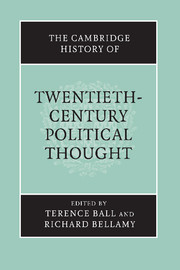Book contents
- Frontmatter
- Editors’ introduction
- Part I The changing fortunes of liberal democracy
- 1 The coming of the welfare state
- 2 Politics and markets: Keynes and his critics
- 3 The advent of the masses and the making of the modern theory of democracy
- 4 Nationalism and imperialism
- 5 Fascism and racism
- 6 Conservatism
- 7 Christian democracy
- 8 Critics of totalitarianism
- 9 The end of the welfare state?
- Part II Varieties of Marxism
- Part III Science, modernism and politics
- Part IV New social movements and the politics of difference
- Part V Beyond Western political thought
- Biographies
- Bibliography
- Subject index
- Name index
- References
5 - Fascism and racism
from Part I - The changing fortunes of liberal democracy
Published online by Cambridge University Press: 28 March 2008
- Frontmatter
- Editors’ introduction
- Part I The changing fortunes of liberal democracy
- 1 The coming of the welfare state
- 2 Politics and markets: Keynes and his critics
- 3 The advent of the masses and the making of the modern theory of democracy
- 4 Nationalism and imperialism
- 5 Fascism and racism
- 6 Conservatism
- 7 Christian democracy
- 8 Critics of totalitarianism
- 9 The end of the welfare state?
- Part II Varieties of Marxism
- Part III Science, modernism and politics
- Part IV New social movements and the politics of difference
- Part V Beyond Western political thought
- Biographies
- Bibliography
- Subject index
- Name index
- References
Summary
The analysis of fascist political thought is a difficult task for several reasons. The political genus of fascism is itself poorly defined, and the conclusion has sometimes been advanced that fascism primarily represented a form of praxis, inherently non-ideological and without formal thought or programme. Moreover, as early as 1923 there developed a growing tendency to generalise beyond the initial Italian example and apply the term ‘fascism’ or ‘fascist’ to any form of rightwing authoritarian movement or system. More broadly yet, Soviet Stalinists began to apply the term, usually hyphenated with some additional adjective, to any and all rivals. By the 1930s fascist had sometimes become little more than a term of denigration applied to political foes, and this usage as a very broad and vague pejorative has continued to the present day.
A limited consensus has nonetheless emerged among some of the leading scholars in the study of fascism, who use the term to refer to a group of revolutionary nationalist movements in Europe between the two world wars, first in the cases of the Italian Fascist and German National Socialist parties and then in the cases of their clearest counterparts in other European countries. This limited consensus tends to agree that specific movements bearing all or nearly all of the same common characteristics did not exist prior to 1919 and have not appeared in significant form in areas outside Europe or in the period after 1945 (Griffin 1998, pp. 1–16).
- Type
- Chapter
- Information
- The Cambridge History of Twentieth-Century Political Thought , pp. 123 - 150Publisher: Cambridge University PressPrint publication year: 2003
References
- 2
- Cited by

